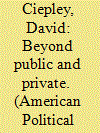| Srl | Item |
| 1 |
ID:
121094


|
|
|
|
|
| Publication |
2013.
|
| Summary/Abstract |
This article challenges the liberal, contractual theory of the corporation and argues for replacing it with a political theory of the corporation. Corporations are government-like in their powers, and government grants them both their external "personhood" and their internal governing authority. They are thus not simply private. Yet they are privately organized and financed and therefore not simply public. Corporations transgress all the basic dichotomies that structure liberal treatments of law, economics, and politics: public/private, government/market, privilege/equality, and status/contract. They are "franchise governments" that cannot be satisfactorily assimilated to liberalism. The liberal effort to assimilate them, treating them as contractually constituted associations of private property owners, endows them with rights they ought not have, exacerbates their irresponsibility, and compromises their principal public benefit of generating long-term growth. Instead, corporations need to be placed in a distinct category-neither public nor private, but "corporate"-to be regulated by distinct rules and norms.
|
|
|
|
|
|
|
|
|
|
|
|
|
|
|
|
| 2 |
ID:
153788


|
|
|
|
|
| Summary/Abstract |
The U.S. Constitution is best understood not as a “social contract,” but as a popularly issued corporate charter. The earliest American colonies were literal corporations of the Crown and, like all corporations, were ruled by limited governments established by their charters. From this, Americans derived their understanding of what a constitution is—the written charter of a sovereign that ordains and limits a government. The key Federalist innovation was to substitute the People for the King as the chartering sovereign. This effectively transferred the “governance technology” of the corporation to the civil government—including the practice of delegating authority via a written charter, charter amendment, and judicial review. Federalists used these corporate practices to frame a government that united seeming irreconcilables—a government energetic yet limited, republican yet mixed, popular yet antipopulist—yielding a corporate solution to the problem of arbitrary rule. Leading founders considered this new government a literal chartered corporation of the People.
|
|
|
|
|
|
|
|
|
|
|
|
|
|
|
|